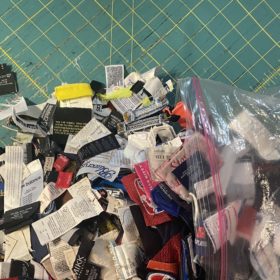Lauren Novak, founder and creative director of Remark by Lauren, doesn’t believe in the word “upcycling.” “It makes me mad,” she admits over video chat. “I think it cheapens what we as sustainable designers do and makes it feel very ‘craft fair’ when, in fact, every company should be doing it or at the very least using biodegradable or natural materials.”
The one-of-a-kind pieces created by Novak for her Toronto-based brand are far from what you might find at an average market stall. While the designer defines her design directive as one of comfort, a quick look at her Instagram provides a more expansive view, as Y2K nostalgia and Miu Miu-esque silhouettes abound. To make her whimsical wares, she uses pre-existing materials such as dead-stock fabric and discarded clothing instead of traditional textiles as a response to the fashion industry’s environmental impact.
View this post on Instagram
The quintessential moment in Novak’s sustainable origin story derives from her experience in retail. Working in the stockroom, she was shocked by the amount of paper and plastic used before the products even made it to the sales floor. “The trash just from step one was ridiculous, and it awoke something in me,” she says.
However, it wasn’t until Novak collaborated with a friend on a custom piece that she realized her hobby could become something more than an occasional Mother’s Day gift. “I learned to sew in Grade 4, and I would make things for myself and my mom, but it wasn’t until I made that garment for my friend that I thought I could actually make this into a business,” she says.
Now, four years later, Lauren Novak has become a must-see maker at the annual Fashion Art Toronto runway presentation, and in 2021, she presented her Sleepover collection at New York Fashion Week. Here, FASHION got an inside look into the designer’s process and how she turned hundreds of leftover labels into a contemporary two-piece.
Thinking out loud

“For this outfit, I chose the material first and the silhouette second. Any time I deconstruct a vintage garment, I try to save every little scrap of it, including its tags. I’ve collected hundreds of them over the years, and I knew I wanted to create something with a very simple design to let the tags speak for themselves.”
Tag team

“You can use many different materials to create fabrics, but I prefer to sew something onto something else. For this, I used an old bedsheet as the base and precut the pattern pieces so I didn’t have to cut the tags. After that, I played with different combinations of labels and then pinned them on. It was like a game of Tetris.”
In stitches

“Topstitching is necessary in the process to make sure the tags stay in place. Instead of just doing something simple, I wanted to add another layer of detail and accentuate a woman’s curves. It’s more obvious in the top as it was designed to resemble a corset, but both pieces are designed to complement the shape of a woman’s body.
“Next, I lined the almost-finished garment with material from another cotton-based bedsheet. The excessive topstitching might irritate some people’s skin, so the additional layer will help with that. Comfort is very important to me in anything and everything I do. If I’m working on a crazy design, I always make sure it’s lined with a soft fabric. I always ask myself ‘Would I wear this, and is it cozy?’”
Finishing touch

“For the top, I wanted to give the wearer the ability to choose the fit, so I included multiple closures. You can do up all three hook-and-eye fasteners for a fitted look, or you can flip it around and wear it as a vest. For the bottoms, I added a waist detail that allows the skirt to be worn either above or below your natural waist.”
Endnotes
“I’m happy with the way this matching set turned out, but I wasn’t at first. When I was placing the tags, I realized the fit of the top needed to be fixed and I re-evaluated the base fabric — thank God I hadn’t sewn down the tags yet! Once I fixed all that, I was happy. But I’m such a perfectionist that I won’t show anybody anything I’m not happy with.”
This article first appeared in FASHION’s April issue. Find out more here.
The post This Designer Turned Leftover Garment Tags Into A Trendy Outfit appeared first on FASHION Magazine.
Powered by WPeMatico






